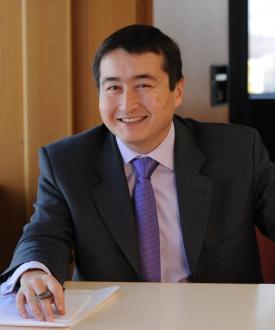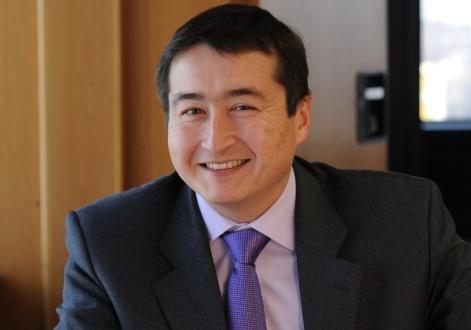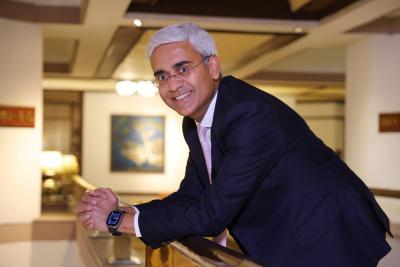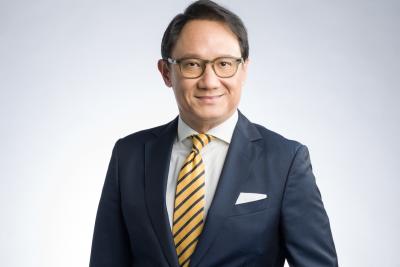Lombard Odier’s Asia Pacific CIO on Discipline, Institutional Rigour and A Clear Vision Ahead

Jean-Louis Nakamura of Lombard Odier
Mar 17, 2020
If there was a prototype of a trans-national private banker and a truly global citizen, it could well be Jean-Louis Nakamura, whose bloodline, as well as personal and professional history, so neatly span the East and the West. As Chief Investment Officer, Asia-Pacific, and head of the Hong Kong office at Swiss private bank Lombard Odier, he has a world of experience of wealth management and a deep insight into the key trends that will likely emerge in the years ahead. His background in leading French state institutions and with Lombard Odier has provided him with his rigorous discipline to investing, and his long experience offers him invaluable insights into the future of private banking. He met with Hubbis again recently and provided what proved to be another fascinating discussion.
Nakamura opens the discussion by addressing the challenge of private banks migrating more to an advisory-for-fee value proposition. “My view,” he says, “is that if banks are unsuccessful in demonstrating the ability to provide value-added advice if they do not perform better than robo-advisories, then they will not exist for that long, as there will no longer be a clear rationale for clients to work with the private bank rather than through an automated brokerage or platform, armed with digital advisories.”
But a key challenge, he adds, is the accountability, as it is not by any means the case that the results of the advice are always followed by the clients, and even if they are, very often the tracking of the results is never completely crystal clear.
Engage and retain
Nakamura believes the key for the private banks must be engagement with and retention of their clients. “The banks must be careful to help clients manage volatility out there,” he reports. “Any time the client will feel uncomfortable because of the market fluctuations, he will stop trading, and then revenues will collapse, so this volatility is a huge source of concern for many banks today. And managing this carefully will help the clients to make returns in a consistent way over time. This is a key rationale why many banks today would like to develop their DPM, migrating away from the transaction-based model. It's not that easy, but this will help clients and the bank deliver consistent returns, over time.”
He expands on the ‘not easy’ comment, highlighting how the usual argument from clients has been that they want to retain control of the decision-making on their portfolios. “But that is the old way of thinking,” he observes, “when it was more these very successful entrepreneurs that made a lot of money, very fast, in their own business, and they believe that it will be easy to do the same in financial markets. So, things are changing gradually, especially with greater volatility.”
Don’t resist change
He then addresses the resistance to change amongst the RM community. “They have tended to see themselves as experts in their client relationships and experts in terms of financial markets, investment, portfolio construction,” he reports. “This has varied from RM to RM, of course, but what we have seen is some of the banks trying to refocus them to retaining their clients, and also working harder to bring in new clients, rather than directing the portfolio. It is a change really from the way things were done some years ago, and even today.”
A key driver of change, Nakamura adds, is that some years ago, and looking back over recent decades, clients were more interested perhaps in putting money out of sight of the authorities, rather than seeking performance on those assets. “But today, in a world of tight regulation and oversight,” he comments, “the private banks now have to deliver return and performance. Clients are not coming to them anymore to hide money or avoiding tax, performance has come to the foreground, so any private bank that is not also a solid asset manager delivering institutional-level, risk-adjusted portfolios will struggle.”
He also notes that there is a natural resistance to migrating from what were often very appealing transactional revenues to more stable, but perhaps initially lower, fee-related revenues. “Actually, for us at Lombard Odier,” he reports, “the bank has always focused on DPM and recurring revenues, which have always been more profitable than transaction-driven, so we have less of an issue in honing the skills of our RMs to these more stable revenues. And our RMs fully understand that they can entirely rely on the asset management and portfolio management team, which sits down the corridor from them, to achieve institutional-level portfolio service to the RM’s clients.”
And he indicates that the symbiotic nature of these internal relationships means that they all understand that robust performance and risk management will result in better client performance, better client satisfaction and therefore more predictable revenues and personal income.
Achieving a scalable model
As this happens, Nakamura explains, banks are shifting their resources away from the less scalable business – the low intensive advisory businesses or execution-only models - to centralised portfolio management teams. “This model is scalable,” he explains, “as those portfolio management teams can manage many clients’ portfolios, so, for example, my DPM team manages 250 portfolios with five people, so the marginal cost of taking on a new portfolio will be very low, so the additional revenues will be very profitable. It makes simply good sense.”
He elaborates further on this point, maintaining that Lombard Odier’s private banking model will, in his view, win out over online platforms that offer some type of digital portfolio construction. “Those platforms can be a very good way to access the markets,” he comments, “providing we are talking about somewhat plain vanilla portfolios, but we believe we offer our clients something more valuable in construction and in terms of risk management. If in the long run we do not demonstrate that our understandably higher fees actually add value either in terms of additional return or in terms of lowering the risk, or both, then clearly we could struggle.”
Defining the proposition
But he concedes that to convince clients is of course not so easy. “Nevertheless,” Nakamura comments, “we define the risk budget at the very beginning of the relationship and then tailor the risk management to avoid significant losses when markets fall, vital especially as most investors are highly allergic to any losses, even in times of sell-offs in the market. We demonstrate this to our clients at the outset, as over time markets perform, although there will be vacillations. In short, whatever the risk budget of the individual clients – and these vary significantly – the efficiency of the portfolios is most of the time measured through the Sharpe ratio, and we have been achieving a very high risk-adjusted return, above level 1 consistently over time for the last seven years.”
Looking further ahead
Stepping further back to survey the competitive landscape and to look in his crystal ball, Nakamura believes the private banking industry will continue to evolve in the decade ahead, but it will look very different from today.
“I believe this private banking industry will change significantly, whereby the divergence of the frontier between asset management and private banking will be much more blurred, whereby the RMs are the point people for what is a scalable asset management organisation. If so, the industry will thrive.”
Nakamura then turns his attention specifically to the DPM proposition Lombard Odier offers and the psychology of decision making.
“In a nutshell,” he observes, “DPM clients must let someone else manage their money. Not easy to do, but we work hard to demonstrate that we offer a highly disciplined, very systematic, non-emotional strategy. Even for myself, I have been prone to taking buy or sell decisions for less than rational reasons, but I know from long experience that an institutional approach stressing a systematic, very disciplined, almost cold-blooded way is the right thing to do. Trading in and out based on perception or emotion is never the right way to approach portfolio performance. We have to take the individual out of the equation and focus on analysis and discipline, which is exactly what we do.”
He also looks beyond portfolio management to the need to view clients holistically. “The RMs can trust our portfolio managers to do the best possible jobs,” he comments, “allowing them to allocate much more time to take care of all the other dimensions of the relationship, which are equally important. These could be the family wealth planning issues, the structuring of the trusts and other vehicles, the key tax issues, legacy planning and so forth. I can tell you that our RMs really enjoy this approach, as it helps them build better client relationships and greater personal satisfaction.”
“Moreover,” he adds, “clients sleep better at night once they adjust to this approach, and the RMS also sleep better as well. The portfolio managers sleep well as they are following a highly disciplined approach. And consequently, thankfully, so do I!
His final word is briefly on regulation, predicting that the regulators in Asia will likely tighten up rules on defining DPM, a move he both expects and for which Lombard Odier is well prepared.
“The world of private banking and wealth management is becoming more and more transparent and disciplined than in the past, driven by both global and local regulation, as well as client expectations. If the industry players don’t adapt their business models rapidly, they risk the stability and longevity of their organisations. It is as fundamental as that.”
Shutting out the Market Noise and Focusing on Pure Objectivity
Jean-Louis Nakamura, Chief investment officer, Asia-Pacific, and head of Hong Kong office for Lombard Odier group for Asia at Swiss private bank Lombard Odier, has been devout in his belief in and communication of the perils of paying too much attention to ‘noise’ around the investment markets. Here we briefly summarise his views:
“Noise in the market,” Nakamura reports, “is any piece of information which is not related to economic fundamentals that ultimately has little real effect on the markets and investments.”
The core developments to watch for and take note of would, for example, include earnings announcements and direction from companies, GDP data, inflation releases and projections, policies that are driven by central banks or governments, and so forth.
“Whereas ‘Noise’, on the other hand,” he observes, “would include political or geopolitical developments and natural disasters. These issues will not usually have any material, lasting impact upon policies or economies, and most of the time, they will have no persistent effect upon the markets and investments.”
Investors urged to block out noise
Nakamura urges clients to ignore this noise, as it can lead to over-emotional decision-making. “It requires a lot of discipline to take a non-emotional approach to investment,” he observes. “But my experience shows me clearly that if investors fall victim to market noise, they can make mistakes. Noise can force investors to become trapped in a situation where decision-making becomes harder.”
They can then be torn between staying put when moving would be a smarter choice, or even worse, panicking and taking the bold decision to protect their portfolio and disinvest, thereby losing either money, or opportunity, or both.
“Jumping ship is a typical mistake that investors who are overly sensitive to noise and emotions will face in the management of their own portfolios,” warns Nakamura.
If in doubt, outsource
This jittery, destructive behaviour is one of the reasons a client should consider a Discretionary Portfolio Management (DPM) mandate, Nakamura advises. “Outsourcing investments to a professional asset management team through a DPM mandate can reduce the emotional rollercoaster an investor can experience. DPM must be conducted in an emotionless, detailed well-defined and clearly-explained way, and of course, implemented with the strictest discipline.”
Nakamura offers an example of a typical DPM mandate a client might have with Lombard Odier. “At Lombard Odier Asia,” Nakamura explains, “we exclusively propose core DPM portfolios with multi-asset strategies. This means we focus upon diversification within a set of both traditional and alternative asset classes. This diversification means that in a DPM mandate held at Lombard Odier, there will be a mix of developing equities, emerging equities, credit, emerging debt, sovereign bonds and commodities. We do not allocate with regard to views of the market, but instead based upon their relative risk as measured today in the market.”
This means that each time an asset class moves away from the others in terms of relative risk, exposure to this asset is reduced in favour of other assets. This keeps the proportion of risk across asset classes constant over time, and the total level of risk of the portfolio stable.
Getting Personal with Jean-Louis Nakamura
Despite his Japanese surname, Jean-Louis Nakamura is as French as the iconic French beret. Born in Paris to a Japanese father and French mother, his education took place mostly in Paris and at leading name institutions. "Yes, I have a Japanese name," he says jovially, "but I am completely French, I must say."
He enjoyed a typically formal education in France, and later graduated in both political science and economics. He had attended a famous French civil service school ENA, Ecole Nationale d'Administration before taking his first job at the French Treasury where he was lucky enough to be surrounded by some highly skilled economists.
"They taught me almost everything that I know about economics and strategy," he recalls, "including someone who is now on the board of the European Central Bank. It was a fascinating and very fruitful time in my life, in terms of absorbing a lot of elevated technical skills in terms of economics, something that you don't really learn at school or university. I was also very lucky to be in Brussels between 1999 and 2001 when the Euro was first introduced, allowing me to become familiar with the workings of the European institutions."
Nakamura's background is highly disciplined, as it is largely institutional. After the French Treasury, he was later Chief Investment Officer of the French Pension Reserve Fund, which he describes as a small-scale sovereign fund for French pensioners.
"That was also a fascinating role, as we were starting from scratch," he remarks. "In fact, throughout my career, I have been fortunate enough to be involved in situations with little legacy, and therefore, for example, driving the investment policy of a large pension scheme allowed me to build close connections to the global pensions industry and to learn a lot from that experience."
After that Nakamura was briefly managing director of the civil service pension fund in Paris before joining Lombard Odier in March 2008, since when his career and his enjoyment of private banking have both flourished. Nakamura is married and has a large family of four children aged between six and 21 years old.
For leisure, Nakamura is not a natural sportsman but is sufficiently disciplined to take part in outdoor activities for health reasons. "We need to keep ourselves in good shape," he remarks, "and for other pastimes, I most enjoy travelling and cooking, the latter of which is actually not that different from managing portfolios, by the way."
“For vacations, we still love skiing in Niseko, in Hokkaido in Japan, or trips to Europe” he reports. “And for work and family life, we are very happy in Hong Kong, which I personally believe will continue to act as an important window or gateway for China in terms of capital markets, and unlikely to be eclipsed by Shanghai, I feel. Hong Kong is also a wonderful hub for Asia, in more normalised times! In short, we believe Hong Kong still has an edge, but of course, it is all dependent on the Hong Kong population to advance into the future.”
On a final note, Nakamura notes that he loves cooking, that his culinary skills try to blend the remarkable cuisines of both France and Japan, and Nakamura has learned much from his French Laotian wife. "She loves to cook and has taught me Laos and Thai cuisine,” he says on closing the discussion. “And I sometimes joke that cooking Lao food is a little bit like managing the diversified portfolio, handling all the different, often contrasting ingredients and learning the secret of combining them to achieve a balanced whole.”

Chief Investment Officer, Asia Pacific - Chief Executive Officer, Hong Kong at Lombard Odier

More from Jean-Louis Nakamura, Lombard Odier
Latest Articles






